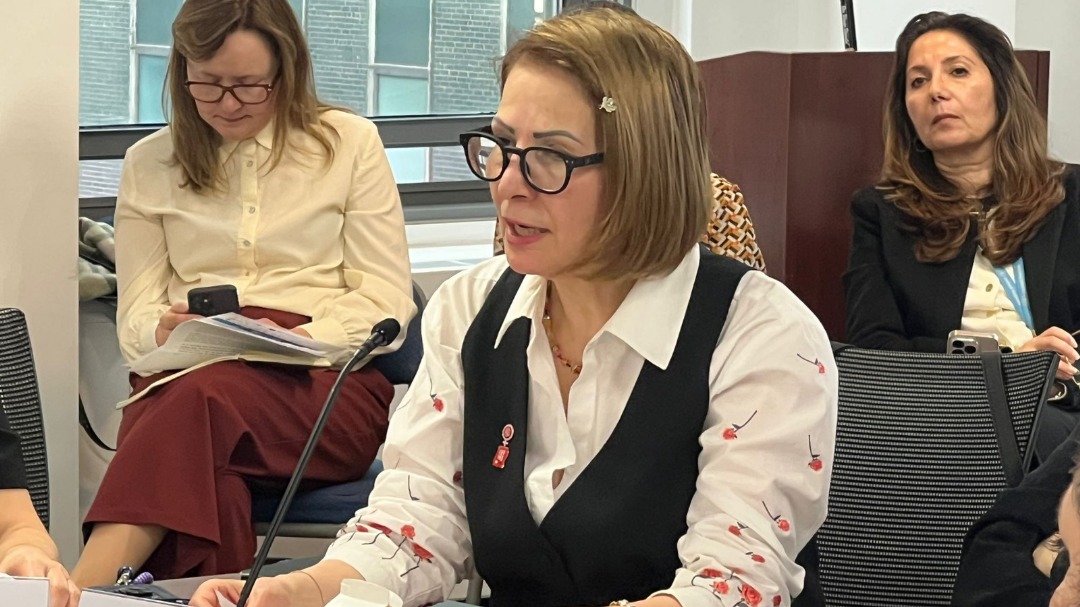Statement by Samira Zureir on Behalf of a Coalition of Syrian Feminist Civil Society Organizations, During the Event: “Our Path Toward Equality, Justice, and Democracy”
- updated: November 4, 2025
Ladies and gentlemen, colleagues,
I stand before you today on behalf of the Syrian Women’s Network, founded in 2013 to amplify the voices of women who confront daily systems of violence and marginalization in the context of a protracted conflict and a society shaped by deeply entrenched patriarchal structures in politics, culture, and institutions.
Syrian women have long been excluded from meaningful political participation, both in representation and in influence. This exclusion has been particularly evident in peace processes, such as the Geneva and Astana talks, where women were either absent or included only symbolically. In the most recent selection of members of the People’s Assembly, women secured only 5% of seats — a stark indicator of the persistence of political structures that reinforce exclusion rather than reform.
But Syrian women are not merely marginalized — they are targeted. Amid ongoing security fragmentation, women face escalating threats: from abduction, to sexual violence, to harassment and intimidation. These are not random acts; they are gendered and political in nature, used to silence women and restrict their participation in public life. Therefore, Syrian feminist activists call on international bodies to continue monitoring these violations, documenting them publicly, and ensuring accountability for crimes committed against women.
Even in digital spaces — where freedom of expression is presumed — women face orchestrated harassment campaigns that do not critique their opinions, but rather attack their identities, bodies, and personal lives. Digital media is deployed to discredit women activists and political actors, driving them out of public space and reproducing silence.
Yet despite all this, local women’s groups and networks continue to work on the frontlines: protecting at-risk women, documenting violations, and providing essential support services. In the absence of effective state institutions, these networks are indispensable. However, women’s organizations continue to be marginalized and lack the legal, financial, and institutional support required to sustain their work and advance national legislation that protects women’s rights, criminalizes gender-based violence, and ensures real enforcement.
At the Syrian Women’s Network, we are not only calling for protection — we are calling for recognition, justice, and the reconstruction of institutions on non-patriarchal foundations that guarantee real representation and meaningful participation of women in shaping Syria’s future.
We believe that political transition cannot be just unless it dismantles the patriarchal structures that govern society and state. A democracy cannot be built while excluding half the population, and peace cannot be realized without accountability for those who have perpetrated violence against women — in prisons, in state institutions, or through media platforms.
In this context, UN Security Council Resolution 1325 must serve as both protection and roadmap, safeguarding Syrian women from violence and guaranteeing their participation in shaping the future of the country. Implementing the principles of Resolution 1325 is not optional — it is a prerequisite for any sustainable recovery in post-conflict Syria.
Today, we call for:
- The inclusion of women in all stages of the political process, with no less than 30% representation, backed by real authority
- Accountability for all those who have committed violence against women, whether in political office or public space
- Support for independent feminist movements, not as symbolic actors, but as agents of change
- Dismantling patriarchal discourse in media and politics, and rebuilding a national narrative that is inclusive and just
- Sustained legal, financial, and institutional support to local women’s groups, enabling them to develop fair national policies
Syrian women are not asking for privileges.
We are demanding our rights — and women are already demonstrating leadership, resilience, and transformative political vision every day.
Let us listen to them — not as victims, but as architects of the future.
New York, Tuesday, October 28, 2025
Statement delivered on behalf of:
Amal Center for Advocacy and Recovery
Badael
Syrian Female Journalists Network
Syrian Women’s Network
Women Now for Development
